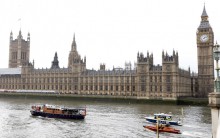The United Kingdom has of late been in the limelight. Past year, it was Queen Elizabeth’s Diamond Jubilee and Brexit. Brexit happened contrary to most analysts’ expectations. This February, Queen Elizabeth marked her Sapphire Jubilee: 65 years on the throne, the longest term in British history [she became monarch on the death of her father, King George VI, from lung cancer at age 56 on February 6, 1952]. Prime Minister Theresa May said: “Today’s Sapphire Jubilee marks yet another remarkable milestone for our remarkable Queen. I know the nation will join with me today in celebrating and giving thanks for the lifetime of service Her Majesty the Queen has given to our country and to the Commonwealth. ... She has truly been an inspiration to all of us and I am proud, on behalf of the nation, to offer our humble thanks and congratulations on celebrating her Sapphire Jubilee.”
In 2011, the wedding of Prince William, Duke of Cambridge, and Catherine Middleton at Westminster Abbey was broadcast live, watched by two billion, one-third of the planet’s population.
The Royal Family is traditionally held in esteem in the United Kingdom. Some analysts believe that its ratings dropped after the death of Princess Diana, but the family has since made every effort to restore public confidence.
The United Kingdom is one of the world’s oldest monarchies. It still has no constitution, but Magna Carta is regarded as the first unwritten constitution, a legal instrument that laid the foundations of the rule of law.
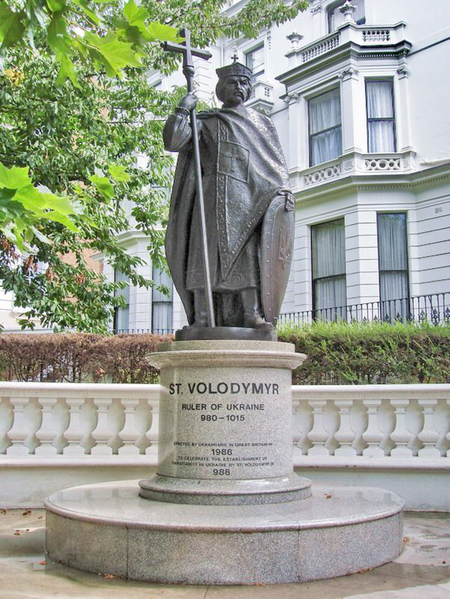
THE MONUMENT TO KYIVAN PRINCE VOLODYMYR THE GREAT STANDS IN LONDON NEAR HOLLAND PARK UNDERGROUND STATION, THE UKRAINIAN CLUB, AND THE EMBASSY OF UKRAINE. DESIGNED BY THE UKRAINIAN CANADIAN SCULPTOR LEO MOL (LEONID MOLODOZHANYN) AND FUNDED BY THE UKRAINIAN COMMUNITY, IT WAS UNVEILED ON MAY 29, 1988, TO MARK THE 1,000th ANNIVERSARY OF THE BAPTISM OF KYIVAN RUS’
With a population of over 65 million, the UK boasts a total of $2.65 trillion GDP, placing fifth in the world ratings. A number of historians refer to a period starting in 1815 and ending in 1914 as “imperial.” At the time, Britain owned some 26 million square kilometers of land (about one-fourth of all dry land) inhabited by some 400 million (about one-fourth of the world’s population). After the victorious end of the Napoleonic Wars, the British Empire saw only Russia and Central Asia as serious rivals. The Royal Navy was the strongest and it kept most sea merchant routes under control. This period is historically known as Pax Britannica. Apart from its colonies, the empire was a powerful factor in world trade and kept a sensitive, strong finger on the economic pulse of numerous formally independent Latin American countries, China, and Siam.
In 1821, the Caledonian Mercury wrote of the British Empire: “On the dominions the sun never sets; before his evening rays leave the spires of Quebec, his morning beams have shone three hours on Port Jackson, and while sinking from the waters of Lake Superior, his eye opens upon the Mouth of the Ganges.”
This empire deserves every praise for allowing its colonies to call it quits, peacefully, and become independent states while maintaining contact with the United Kingdom as the Commonwealth of Nations numbering 52 countries.
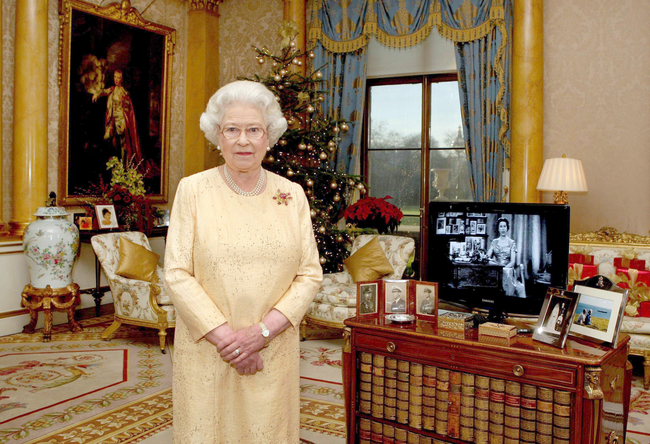
DECEMBER 12, 2007. LONDON. BUCKINGHAM PALACE. QUEEN ELIZABETH II IS GOING TO RECORD THE CHRISTMAS SPEECH TO BE BROADCAST ON CHRISTMAS EVE
Needless to say, many in Ukraine closely followed Queen Elizabeth’s Diamond and Sapphire jubilees and the wedding of Prince William and Catherine Middleton. The relationships between Ukraine and the United Kingdom date back centuries, starting with Kyivan Rus’ when Agatha, daughter of Grand Prince Yaroslav the Wise, married Edward the Exile of the royal family of England. There is a monument to Prince Volodymyr in London.
The Day’s Editor-in-Chief Larysa Ivshyna has on more than one occasion suggested that Ukraine use its long relations with the United Kingdom and become “Ukrainian Britain in the Slavic world.”
In an interview with The Day, Ambassador Judith Gough said that Ukraine had to find its place, adding that Great Britain had been effectively finding it throughout its history.
Below are expert opinions in response to the question: “What attracts Ukrainians to Great Britain, what should Ukraine borrow from its experience?”
RULING ELITE
Volodymyr VASYLENKO, ex-ambassador to the UK (1998-2002), international lawyer:
“Great Britain, of course, can serve as an example of how to keep an adequate living standard, combat corruption, cope with environmental problems; how to keep the historic part of the capital city and that of other cities; how to deal with the Mafia-like developers who are prepared to ruin all historic sites to build their monstrosities, to make their fortunes while depriving people of comfortable living conditions.
“It is true that the United Kingdom has no constitution in writing, but it ensures the people an adequate living standard by adhering to tradition, customs, and upholding the rule of law. Ukraine has its Constitution, but the problem is that those ‘upstairs’refuse to abide by it, just as they have no respect for any laws. Our problem is not the presence or absence of a constitution, but the quality of the ruling elite.
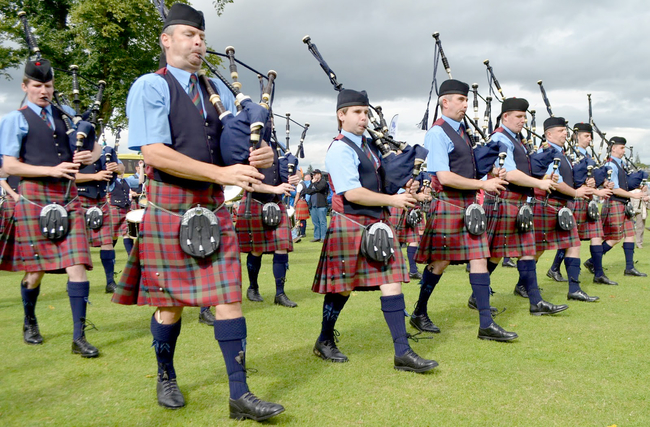
BRITAIN IS ASSOCIATED ALL OVER THE WORLD WITH THE SCOTTISH BAGPIPE WHOSE SOUND AROUSES THE SPIRIT OF WARRIORS AND SCARES ENEMIES. NO CEREMONIAL EVENTS ARE HELD WITHOUT THIS INSTRUMENT. EDINBURGH MILITARY TATTOO, AN INTERNATIONAL BRASS BAND FESTIVAL HELD SINCE 1947, PLAYED AN IMPORTANT ROLE IN POPULARIZING THE BAGPIPE
“The British monarchy is a very old tradition. This institution has long served its interests and kept the people united. Here the main point is that none of the Royal Family has been involved in a corruption scandal, accused of embezzlement; that they have all behaved in a manner that has won them public respect.
“Ukraine could become ‘Britain in the Slavic world,’ eventually. Not now. The problem is not the political system. It is the poor quality of the ruling elite… Ukraine has institutions similar to those in the [developed] countries. Compared to Britain, all we lack is a king or queen.”
POLITICAL PARTNER
Volodymyr KHANDOHII, ex-ambassador to the UK (2010-14), president, NGO Ukrainian Foreign Policy Association:
“Great Britain has always been our political partner, supporting our European and Atlantic [NATO membership] effort. We have had good bilateral relations. It is also one of the Top 5 European investors in our economy.”
SUCCESSFUL COUNTRY
Serhii SOLODKYI, first deputy CEO, Institute of World Politics, Westminster University graduate, London:
“Great Britain spells a mix of tradition, modernism, conservatism, and revolution. Brits have been trendsetters in terms of parliamentarism, private ownership, respect for initiative, and deregulation. For me, Great Britain is a window on the world. London is an intersection of cultures and ideas. There you will meet a foreigner more often than a Brit.
“Great Britain spells scientific, economic, and political progress. Any breakthrough, in any of these spheres, refers to research done at a university in the United Kingdom. It also spells Magna Carta that marked the beginning of a new political tradition; Oliver Cromwell and his revolution that encouraged other peoples in Europe to campaign for their civil rights; the charismatic, willful, and insightful figure of Sir Winston Churchill who is still an example for many [politicians] across the world; the Royal Family, probably the most noted among those that still exist.
“Great Britain is teeming with symbols. This country attracts the interest of practically all other countries. I will probably sound speculative when I say that this world would have been different without Great Britain. Anyway, it is small wonder that Ukrainians are drawn to that country… I think it would be hard to single out a reason why the Isles are attracting our interest. For some Ukrainians (including yours truly), this is their rich historical legacy – I believe this is the main reason. For others, this could be their living standard, stability, rule of law. That’s probably why our nouveaux riches have been buying real estate in London and bringing their cases to British, rather than Ukrainian, courts of law.
“Great Britain is a successful country. The sweet smell of success, the desire to fight and win, look for new recipes of success – this could be another reason behind our interest in that country.”
SERVING SOCIETY
Serhii KOMISARENKO, independent Ukraine’s first ambassador to the UK (1992-98):
“Each of the Isles is special in its own way, but Britain stands out among them. This is explained by certain characteristics of that country that I can only describe as captivating. First, its page-turning history. We learned most of it from Sir Walter Scott’s novels. We were young and enchanted by all those books about the brave and courtly knights, Robin Hood, Richard the Lion’s Heart, King Arthur and his Round Table, about the Crusades. Second, there is that special British mentality, sense of humor, and tradition. Britain gave the world an indispensable language for intranational and/or international communication, and it boasts one of the world’s oldest monarchies (dating back more than a thousand years). This monarchy is very special, rooted in tradition. The monarch’s powers are very limited. The King or Queen never meddles in the way the Cabinet is running the country. But that is what meets the eye. In actuality, the monarch plays a very important role. S/he is always present in public life. All acts of the government are done in his/her name, as head of state and of the Church. Whereas presidents and prime ministers come and go, the monarch stays as a criterion of political stability, as a link to that country’s age-old history, as a symbol of national dignity and justice. Queen Elizabeth II and her father George VI serve as graphic examples. I have been fortunate enough to speak with Her Royal Majesty and this has remained an unforgettable experience.
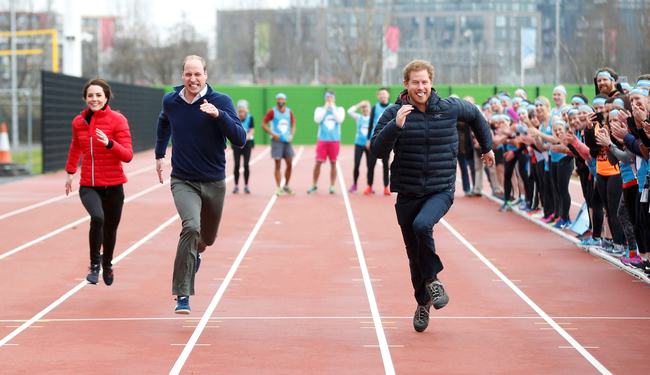
FEBRUARY 7, 2017. QUEEN ELIZABETH II OLYMPIC PARK. PRINCE WILLIAM, CATHERINE, THE DUCHESS OF CAMBRIDGE, AND PRINCE HARRY TAKE PART IN A TRAINING RACE TO PROMOTE THE CHARITABLE CAMPAIGN HEADS TOGETHER AIMED AT SOCIALIZING THE MENTALLY IMPAIRED. ABOUT 150 PEOPLE, WHO PARTICIPATED IN THE TRAINING, WILL RUN A MARATHON RACE ON APRIL 23 IN SUPPORT OF HEADS TOGETHER
“I have been often asked about the most innate British features. They vary, as is the case with any multiethnic country. There are Brits, Scots, Welsh, Irish, and other ethnic communities in the United Kingdom. They differ in terms of mentality, upbringing, education, religion, and social status, but they have something in common, certain predominant features. I learned this during my posting to the UK. They all want to serve their society – and I mean the people, not the government. Charity is widespread in Great Britain. People who retire start looking for ways to help their society, because they were raised in this spirit. Great Britain pays serious attention to the formation and cultivation of its national elite. The British education system is interesting. There is a saying about free cheese in the mousetrap (which I personally find rather banal). In Great Britain, charity, doing good things for free, is standard practice…”
POLITICAL INDEPENDENCE
Andrii KURKOV, writer, vice-president, Ukrainian Center PEN International:
“Number one, Ukrainians are attracted by such positive British cliches as ‘queen,’ ‘rule of law,’ also by their sense of humor, political independence (I mean Brexit), and their pound that stays above dollar and euro. Number two, Ukrainians appear to know English culture better than those of France, Germany, and so on. Great Britain spells political stability, compared to the hustle and bustle in Ukraine. Number three, they have Cambridge, Oxford, Eton, and this ensures an independent bona fide judicial system.”

